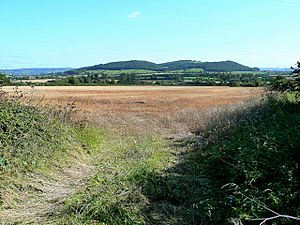Alderton Hill Quarry facts for kids
| Site of Special Scientific Interest | |

The location - Alderton Hill
|
|
| Area of Search | Gloucestershire |
|---|---|
| Coordinates | 52°00′34″N 1°59′31″W / 52.009382°N 1.991941°W |
| Interest | Geological |
| Area | 0.34 hectare |
| Notification | 1997 |
Alderton Hill Quarry is a special place in Gloucestershire, England. It's a small area, about the size of half a football field (0.34 hectares). This site is protected because of its amazing geology. It was officially recognized as a Site of Special Scientific Interest (SSSI) in 1997. This means it's super important for studying rocks and fossils. It's also a Geological Conservation Review (GCR) site, which highlights its importance for understanding Earth's history.
Contents
Where is Alderton Hill Quarry?
Alderton Hill Quarry is found on Alderton Hill. This is in the northern part of Gloucestershire. It is about 2 kilometers southwest of a village called Dumbleton.
What Makes This Site Special?
Ancient Insects and Fossils
This quarry is very important for scientists. It has incredibly well-preserved fossils from the Lower Jurassic period. This time was about 175 to 200 million years ago!
Scientists have found many different types of fossil insects here. These include ancient dragonflies, known as Gomphites. They have also discovered a large fossil cockroach. Besides insects, fish remains and well-preserved cephalopods have been found. Cephalopods are a group of sea animals that include squids and octopuses.
The rocks where these fossils are found are part of the Whitby Mudstone. What makes this site even more special is that the fossils found here are often more complete than those from other places. This helps scientists learn a lot about what these ancient creatures looked like.
Studying Earth's Past
Alderton Hill Quarry is a key place for paleoentomology. This is the study of ancient insects. By examining the fossils here, scientists can learn about the bodies of early insects. They can also understand how these insects changed and evolved over millions of years.
Nature Around the Quarry
The area around the quarry also has rich plant life. The hedges are full of different kinds of trees and bushes. You can find ash, oak, holly, hawthorn, hazel, and spindle trees. The beautiful common blue butterfly has also been seen flying here.

